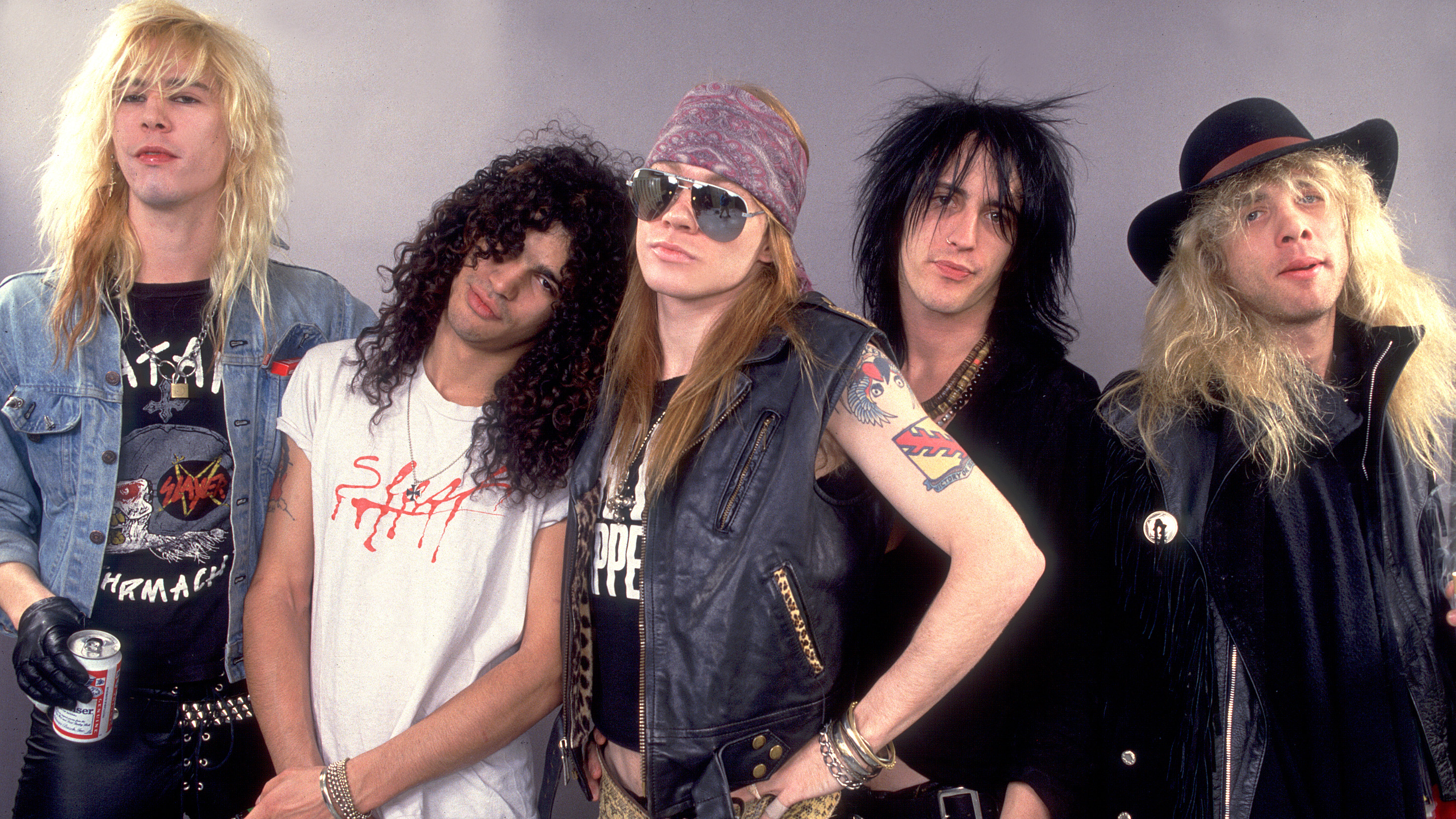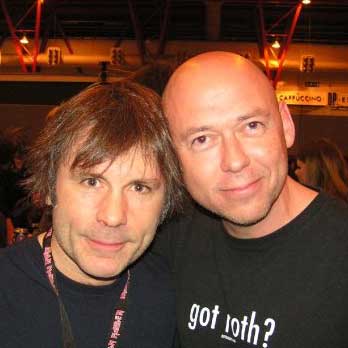“The recording of Appetite For Destruction eventually cost $365,000. It was an outrageous amount to spend on a debut. I worried that we would never dig out of that hole”: Guns N’ Roses’ former manager Alan Niven on the making of a rock classic
“Axl sounded like he had overdosed on helium at certain points”

Appetite For Destruction is one of the biggest selling albums of all time — but when Guns N’ Roses were recording it their manager feared they would never recoup the money it cost to make.
“I thought I'd be lucky to see anything of worth out of this project,” said Alan Niven, who managed the band from 1986 to 1991.
In a 2018 interview with Classic Rock, Niven recalled how he got the album made with the help of Tom Zutuat, the A&R man who signed Guns N’ Roses to Geffen Records.
Niven explained why Mike Clink ended up producing the album after initial recordings with Spencer Proffer, the successful producer of Quiet Riot’s No.1 album Metal Health, and Manny Charlton, the former guitarist for Scottish rockers Nazareth.
And he revealed why the ballad November Rain, singer Axl Rose’s magnum opus, was left off Appetite For Destruction in 1987 and held back for the 1991 album Use Your illusion I.
The band had already begun working on Appetite For Destruction when Niven became their manager.
“I signed a contract with the band in September 1986,” he said, “and there was plenty of material available for constructing an album.
Want all the hottest music and gear news, reviews, deals, features and more, direct to your inbox? Sign up here.
“Just consider the tracks that got left off — the three that were later used on Illusion [November Rain, Don’t Cry and Back Off Bitch], along with Move To The City and Reckless Life.”
The latter two tracks were featured on the EP Live ?!*@ Like a Suicide, which was released in 1986 and reissued in 1988 as part of the mini-album GN'R Lies.
Niven recalled: “Tom Zutaut was expecting Proffer to produce. Around this time Tom gave me some tracks from the Manny Charlton sessions, which were characterised by him as demos. It was our collective understanding that we had yet to begin recording the album for real.
“Both Tom and I considered the recordings done to date as demos, as part of the preproduction process. We thought that the band had yet to be thoroughly represented on tape."
The recordings made with Manny Charlton eventually surfaced as 'The Sound City Session' included in the expanded version of Appetite For Destruction released in 2019.
“The Manny sessions sounded very punk," Niven said. "Axl sounded like he had overdosed on helium at certain points. They sounded like a brash young band making their early recordings.”
Niven admitted that he hated the album that Spencer Proffer had produced for Quiet Riot, with its cartoonish title track Bang Your Head (Metal Health) and a hit cover version of Slade’s ’70s glam rock anthem Cum On Feel The Noize.
“I was definitely not a fan of Quiet Riot,” he said. “Covering Slade, for God's sake, a bunch of Top Of The Pops goofballs. Not exactly Aerosmith or the Stones, what?
“Bang Your Head was ridiculous to me — can you imagine Axl singing that lyric?”
It did not take long for Niven to dispense with Spencer Proffer’s services.
“I asked to meet with Spencer,” he said. “When I arrived for the meet I was met by his assistant who off-handedly took the meeting.
“Spencer obviously thought I did not deserve his time. That was a bad move.
“So Spencer made it easy for me to tell Tom that we needed to look for someone else. Proffer missed his chance to persuade me otherwise.”
Enter Mike Clink, a rookie producer but an experienced engineer who had worked on albums by major rock acts such as UFO and Survivor.
Niven was particularly impressed by Clink’s work with producer Ron Nevison on UFO’s 1979 live album Strangers In The Night — the British band’s last classic album with German guitar hero Michael Schenker.
Said Niven: “Mike Clink was suggested by Tom. I thought it a brilliant idea. Mike was very humble — and thus there would be less likelihood of artist/producer frictions — and a great guitar engineer. His work with Nevison and Schenker was terrific.
“Tom and I were determined to let the band be the band, and for them to self-fulfil their potential. A personality like Mike with his skills was perfect. And we were proved right.”
“Neither the Charlton or Proffer sessions had the gravitas of the Clink recordings —the sweep and majesty. The band matured into the Clink sessions and gained dimension and depth, gained a deeper and broader power.
“Better performances, better tones, better textures, greater confidence, more imagination.
“Just note the opening scream over the intro riff on Welcome To The Jungle. Note how the song locks into a perfect tempo anchored by a huge snare.”
According to Niven, at the end of the recording sessions Mike Clink was too exhausted to undertake the mixing process.
“He was completely out of gas come the mixing sessions,” Niven said, “and we had to look elsewhere.”
Niven called in Michael Lardie, the rhythm guitarist and keyboard player for another band that he managed, Great White. Together they mixed a key track from the Guns N’ Roses album, Mr. Brownstone.
Niven recalled: “Lardie and I did the first mix on the Appetite recordings — Brownstone. It was my way of proving Mike had the performances on tape.
“He [Clink] couldn't get a mix done and Tom was scared shitless that all that time and money was wasted.
“Lardie and I were in the middle of recording [Great White album] Once Bitten, doing guitar overdubs, but we stripped the board and set up for a mix and told Tom to choose a roll of tape and send it down to us.
“In a mere four hours we had a workable mix. The band were waiting at Tom's office to hear what we thought. Had Clink got it on tape or not? ‘You'd better come down,’ I said over the phone.
“Only Izzy [Stradlin, Guns N’ Roses’ rhythm guitarist] had the courage to come down. We hit 'play' and by the chorus he was out of sofa and pumping his fist in the air — a very un-Izzy-like action.
“Everyone was real worried. Clink had it on tape, though.”
The whole album was mixed by Steve Thompson and Michael Barbiero, who had previously co-produced another Geffen Records act, Tesla.
“Tom wanted to go with Thompson and Barbiero, which personally disappointed me,” Niven admitted. “But again, in the eventuality it was a great call, and I was blown away watching them do their manual mix dance — they utterly connected to the energy of the tracks. That’s my perspective, anyway.”
Niven said he knew from the start that Welcome To The Jungle was a pivotal song for the band.
As he recalls it: “The one concern I had when listening to the demos was that one of the songs, which had a weak performance, be concentrated on and brought up to another level.
“I thought it might prove to be an important song on the record, one of which I really loved the social sarcasm. LA was beginning to lose its glitter and gloss to me. That was Jungle.”
He said that he and Zutaut each had their favourites: “Tom was real high on Sweet Child O’ Mine, and I had a major boner for Paradise City.”
November Rain was already written and demoed during the Appetite For Destruction sessions, but Niven says it was always the plan to hold this song back.
“We already had Sweet Child and didn't need November,” Niven said. “Axl was convinced that this [November Rain] was his master stroke, and that it needed even more time and attention. So it qualified as a brilliant hold over."
Keeping this and other songs in reserve was a key part of Niven's strategy.
As he explained: “A band has years to form the material of their debut. Once signed and recorded, if things go well, they will go out and perform those songs for a year or so.
“They will come home exhausted — physically, emotionally and creatively. At that very moment the label will start in with their demands for a follow up — fast — to 'maintain career momentum'.
“That’s why so many bands have weak follow up albums. Tom and I wanted to have material marinating in the larder — to avoid this sophomore jinx.”
However, even with Appetite For Destruction in the can and November Rain in development, Alan Niven was a worried man ahead of the album’s release in July 1987.
“The recording of Appetite eventually cost $365,000,” he said. "That represents a huge amount of studio time.
“It was an outrageous amount to spend on a debut and I worried that we would never dig out of that hole and see any meaningful income.
“I had just become a parent, my son Corey had just been born. Getting paid was now more of a concern.
“As it was, it was over a year before I saw my first penny from GN'R. In December of ’87, Izzy went to look at the books and was horrified to see I had not been paid anything at all.”
As it turned out, Appetite For Destruction did a whole lot better than anyone expected.
Within a year of its release, it was at No.1 on the US chart.
But for Alan Niven, that was as good as it would ever get.
By the time the recording of November Rain was completed to Axl Rose’s satisfaction, a power struggle with the Guns N’ Roses organisation was in full effect.
In the summer of 1991, before the release of the the band’s twin albums Use Your Illusion I and II — the former featuring November Rain — Niven was relieved of his position as Guns N’ Roses’ manager.
Ultimately, Appetite For Destruction would rival Meat Loaf’s Bat Out Of Hell as the biggest selling debut album of all time.
And certainly Alan Niven played his part in that.

Paul Elliott has worked for leading music titles since 1985, including Sounds, Kerrang!, MOJO and Q. He is the author of several books including the first biography of Guns N’ Roses and the autobiography of bodyguard-to-the-stars Danny Francis. He has written liner notes for classic album reissues by artists such as Def Leppard, Thin Lizzy and Kiss. He lives in Bath - of which David Coverdale recently said: “How very Roman of you!”
You must confirm your public display name before commenting
Please logout and then login again, you will then be prompted to enter your display name.





